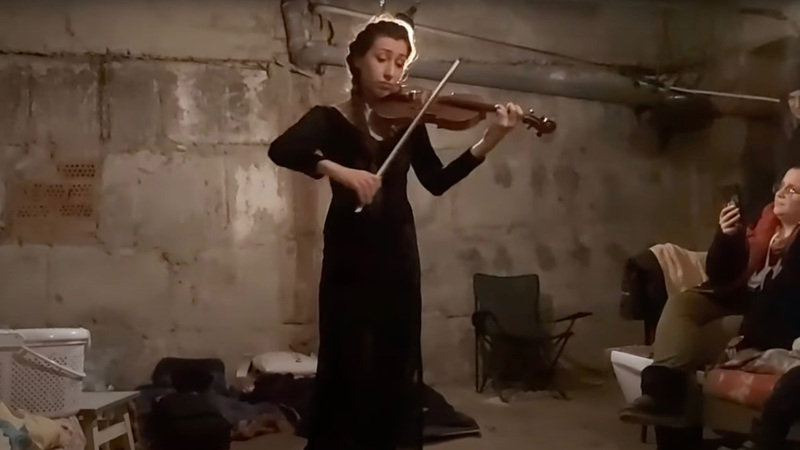
Music in the Bunker
Ukrainian Art as Protest and Resilience
Research by Erin Tutaj ’24
Title: “Ніч яка місячна - The Starry Night”
Artist: Vera Lytovchenko
Format: Musical performance
Placement: Social media
Music can play a central role in protest. From powerful anthems to beautiful ballads and solemn battle hymns, music becomes a unifying force that represents a culture trying to survive. During this time of war, the disruption of daily life has forced Ukrainians to adjust how they can listen to and produce music.
Hiding in the basement of her apartment building due to bomb threats, Vera Lytovchenko performed a popular Ukrainian folk song, “Ніч яка місячна - The Starry Night” for those sheltered with her. Before the war, Lytovchenko was a professional violinist with the Kharkiv City Opera Orchestra. The Kharkiv Opera Theatre was destroyed by a Russian missile on March 1, 2022. This destruction and the wider disruption caused by the war has forced various Ukrainian performers to think creatively with how to best share their craft.

As an expression of protest and resilience in the face of Russian aggression, it is important to understand the place of the performative arts in the history of the Soviet Union and its censorship of Ukrainian language and music. Under both the Russian imperial and Soviet regimes, Ukraine’s diverse musical traditions were heavily regulated and often censored entirely by the authorities. In particular, in the early 20th century musicians would mix poetry with instruments like the bandura to bring together Ukrainian past with its present; thus, challenging Russian colonial power. Today, Ukraine’s unique music culture is again threatened as Russia continues to deny the presence of separate Ukrainian culture.
In keeping Ukrainian culture alive, music becomes a necessary medium of expression to create distinction for their own unique heritage. During the current conflict, artists and musicians have been able to continue sharing their art.
Lytovchenko began posting videos from the bomb shelter because she sees her music as a beacon of light and proof that “someone is alive and someone keeps hope and is optimistic.” The song choice is especially important with lyrics like Come, my love, weary with toil. If just for one minute to the grove (view the full translation). The lyrics allude to a feeling of exhaustion, both present and historical. The Ukrainaians — the soldiers and the civilians — are invited for a moment to rest or find consolation in one another at a communal place. Music is transformative; it has the power to take the listener away from their present reality, whether in a bomb shelter or at the front lines of a brutal war.
As proof of further resilience, a group with the Skhid Opera Kharkiv Orchestra and Kharkiv National Academic Opera and Ballet came together in November 2022 to perform in the underground parking garage of what still remains of the previously bombed Opera Theatre. They demonstrated and expressed their resilience through their steadfast loyalty and commitment to their country and in preserving their culture. In Tango: The Art History of Love (2005) American art historian Robert Farris Thompson encompasses this spirit in his notion that “Culture is forever. It is politics and ego that fade.”
Research by Erin Tutaj ’24
Header image: “St Javelin” by Chris Shaw, acrylic and metal leaf on canvas, completed in March 2022. Image used with permission from Chris Shaw and saintjavelin.com.
Performance by Vera Lytovchenko. Shared with permission from the artist.
Read the project introduction and background.